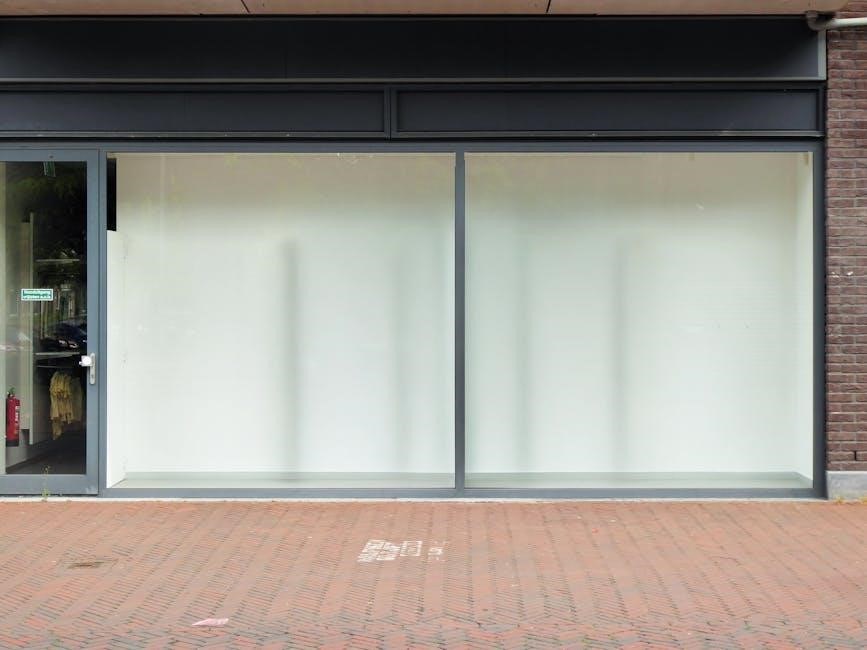The REIWA Commercial Lease Agreement is a standard document used in Western Australia for commercial property rentals. It outlines the terms and conditions between landlords and tenants‚ ensuring clarity and fairness for both parties. This legally binding contract is essential for establishing a clear understanding of responsibilities‚ rent‚ lease duration‚ and property use. It is widely recognized and utilized in the Australian real estate industry‚ providing a structured framework for commercial tenancies.
Key Components of the REIWA Commercial Lease Agreement
The agreement outlines the lease term‚ rent‚ payment terms‚ and responsibilities of both parties. It also covers property use‚ security deposits‚ and dispute resolution processes‚ ensuring clarity and compliance with legal standards.

- Parties Involved
- Lease Duration
- Rent and Payment Terms
- Landlord and Tenant Responsibilities
- Use of Premises
- Security Deposit

The Parties Involved
The REIWA Commercial Lease Agreement clearly identifies the parties involved in the tenancy. The landlord is the legal owner of the commercial property‚ while the tenant is the entity or individual renting the space. Both parties must provide their full details‚ including names‚ mailing addresses‚ and contact information‚ to ensure transparency and accountability. The landlord is responsible for granting the tenant the right to occupy and use the premises for the agreed purpose‚ while the tenant agrees to abide by the terms and conditions outlined in the lease. The agreement also specifies that the landlord retains ownership of the property and common areas‚ if applicable‚ while the tenant is granted exclusive use of the leased premises. Accurate identification of both parties is crucial to avoid disputes and ensure the agreement is legally binding. This section ensures clarity and establishes the foundation for the lease terms. Proper documentation of both parties is essential for enforcing the agreement;
Term of the Lease
The REIWA Commercial Lease Agreement specifies the term of the lease‚ which is the duration for which the tenant is granted the right to occupy and use the commercial property. This term is typically fixed and clearly outlined in the agreement‚ ensuring both parties are aware of the lease period. The lease commences on a specific start date and ends on a specified end date‚ providing clarity and structure for the tenancy. The agreement may also include options for lease renewal or extension‚ subject to mutual agreement between the landlord and tenant. Defining the lease term is crucial as it establishes the timeframe for both parties’ obligations and responsibilities. This section ensures that the lease period is legally binding and provides a clear timeframe for the tenant’s occupancy‚ avoiding potential disputes related to the duration of the tenancy. Proper documentation of the lease term is essential for maintaining a formal and professional relationship between the parties involved.
Rent and Payment Terms
The REIWA Commercial Lease Agreement outlines the rent and payment terms in detail to ensure clarity for both landlords and tenants. The agreement specifies the amount of rent‚ the payment frequency‚ and the acceptable methods of payment. It also defines the due date for rent payments and the consequences of late payments‚ such as penalties or interest charges. The lease may include provisions for rent reviews‚ which can be based on market rates‚ consumer price index adjustments‚ or fixed increases. Tenants are typically required to pay rent in advance‚ and the agreement may specify how rent adjustments will be notified and implemented. This section ensures that both parties are aware of their financial obligations and the procedures for fulfilling them. Proper documentation of rent and payment terms is essential to avoid disputes and maintain a transparent rental relationship. The agreement also provides a clear framework for handling any issues related to rent payments.

Landlord and Tenant Responsibilities
The REIWA Commercial Lease Agreement clearly defines the roles and obligations of both landlords and tenants. Landlords are responsible for maintaining common areas and ensuring compliance with legal standards. Tenants must maintain the leased premises‚ pay rent on time‚ and use the property as agreed. These responsibilities are outlined to ensure a fair and transparent rental relationship.
Landlord Responsibilities
Under the REIWA Commercial Lease Agreement‚ landlords are responsible for maintaining the structural integrity of the property and ensuring compliance with all applicable laws. They must address repairs to common areas and major fixtures‚ such as roofs and walls. Landlords are also obligated to provide tenants with a copy of the lease agreement and ensure the property is legally fit for its intended use. Additionally‚ landlords must manage the security deposit in accordance with the terms outlined in the agreement. They are required to act in good faith and maintain open communication with tenants regarding lease terms‚ renewals‚ or disputes. These responsibilities are designed to protect the tenant’s rights and ensure a fair rental relationship. By fulfilling these obligations‚ landlords can help maintain a positive and professional tenancy experience.
Tenant Responsibilities
Tenants under the REIWA Commercial Lease Agreement are required to fulfill specific obligations to maintain a lawful and respectful tenancy. They must pay rent and any additional charges‚ such as utilities and taxes‚ in accordance with the agreed terms. Tenants are also responsible for maintaining the leased premises in good condition‚ excluding normal wear and tear‚ and must not make unauthorized alterations. They are obligated to comply with all applicable laws and the terms of the lease‚ including proper use of the property for its intended purpose. Tenants must notify the landlord of any necessary repairs beyond their responsibility and ensure the property is vacated in its original condition upon lease termination‚ reasonable wear and tear excepted. Additionally‚ tenants must not sublease or transfer the lease without the landlord’s written consent. Adhering to these responsibilities ensures a smooth and lawful tenancy under the REIWA Commercial Lease Agreement.

Important Clauses in the REIWA Commercial Lease Agreement
Key clauses include terms for rent adjustments‚ property use restrictions‚ security deposit handling‚ lease termination conditions‚ and dispute resolution processes‚ ensuring clear guidelines for both landlords and tenants.
Use of Premises
The REIWA Commercial Lease Agreement explicitly outlines the permitted use of the leased premises‚ ensuring the property is utilized for its intended purpose. Tenants are typically required to use the premises solely for the business activities specified in the agreement‚ preventing unauthorized alterations or misuse. This clause is designed to protect the landlord’s investment by maintaining the property’s value and ensuring compliance with local regulations. Any changes to the intended use must be approved in writing by the landlord. Additionally‚ the agreement often includes provisions that prohibit the tenant from using the premises in a manner that could invalidate insurance policies or violate legal requirements. This ensures that both parties operate within legal boundaries and maintains the integrity of the property. By adhering to these terms‚ tenants can conduct their business responsibly while landlords safeguard their asset.
Security Deposit
The REIWA Commercial Lease Agreement includes provisions for a security deposit‚ which serves as a form of protection for the landlord against potential damages or unpaid rent. The deposit is typically held in trust and returned to the tenant at the end of the lease‚ provided all terms are fulfilled. The agreement specifies the amount of the deposit‚ which is usually a fixed sum or a percentage of the monthly rent. It also outlines the conditions under which the deposit may be withheld‚ such as for property damage‚ outstanding rent‚ or breaches of the lease. Tenants are advised to carefully review these terms to understand their obligations. The security deposit clause ensures that both parties have a clear understanding of their responsibilities regarding the property’s condition and financial obligations. This provision helps maintain a fair and transparent relationship between landlords and tenants throughout the lease period.

Dispute Resolution

The REIWA Commercial Lease Agreement includes specific provisions for resolving disputes between landlords and tenants. It emphasizes the importance of addressing issues promptly and fairly. The agreement typically outlines a structured process for resolving conflicts‚ often starting with direct negotiation between the parties. If disagreements persist‚ mediation by a neutral third party‚ such as a professional arbitrator or a dispute resolution service‚ may be recommended. The lease may also specify arbitration as a final resort for unresolved disputes. The agreement ensures that both parties are aware of their rights and obligations‚ providing a clear framework to minimize conflicts. This approach helps maintain a fair and transparent process‚ protecting the interests of both landlords and tenants. By including these clauses‚ the REIWA Commercial Lease Agreement promotes a harmonious and legally compliant relationship throughout the tenancy.
The REIWA Commercial Lease Agreement is a valuable resource for both landlords and tenants in Western Australia‚ providing a clear and legally binding framework for commercial property rentals. It ensures that all parties understand their rights and responsibilities‚ helping to prevent disputes and maintain a fair tenancy relationship. By outlining key details such as rent‚ lease terms‚ and property use‚ the agreement offers transparency and protection for both sides. Its structured approach to disputes and responsibilities ensures that commercial tenancies are conducted smoothly and professionally. This document is an essential tool for anyone involved in commercial real estate in Western Australia‚ promoting clarity and compliance throughout the lease period. Understanding and utilizing this agreement is crucial for a successful and legally sound commercial tenancy experience.